





In early 2022, the fifth wave of the novel coronavirus epidemic was running rampant and brought unprecedented challenges to Hong Kong. The department stood at the forefront and fought the epidemic together with the public through urgent deployment of officers to participate in multiple compulsory testing exercises in lockdown areas. Officers were even seconded to the Contact Tracing Office to help step up efforts in close contact tracing and assist the staff of the Department of Health (DH) in issuing quarantine orders. To deal with the severe epidemic situation, the government had to set up and manage a large number of isolation and quarantine facilities within a short period of time. The department swiftly responded by deploying officers to support the management of quarantine hotels/facilities. Faced with the rapidly changing epidemic situation, the department held to the people-oriented spirit and remained firmly committed to our duties in fighting against the epidemic alongside members of the public.
Since the outbreak of the fifth wave of the epidemic, the department deployed officers to participate in a number of RTD operations, including the one conducted in Kwai Chung Estate in January 2022, which involved more than 40 officers.
To cope with the fifth wave of the epidemic, the department deployed substantial number of staff members to the Contact Tracing Office of the Centre for Health Protection to assist in contact tracing. From January 2021 to the end of 2022, the total service hours of our staff in the Contact Tracing Office exceeded 220,000 hours, with a daily average of 150 staff members participating in contact tracing during the peak period.
In terms of measures at control points, officers of the Control Branch adopted a number of measures at various control points, including imposing entry restrictions on non-Hong Kong residents for anti-epidemic purposes; assisting the DH in identifying passengers who failed to meet the entry requirements under the prevailing quarantine policy; dealing with persons who intended to depart from Hong Kong via control points before the expiry of their quarantine orders; and removing from Hong Kong persons who failed to fulfill the entry requirements under the quarantine policy.
The Immigration Service Institute of Training and Development deployed training officers to the control room of the Emergency Monitoring and Support Centre of the Security Bureau (SB) for round-the-clock monitoring of emergencies and coordination of the anti-epidemic efforts of various disciplined services departments.
In order to assist the DH in strengthening the monitoring of persons placed under quarantine pursuant to the Compulsory Quarantine of Certain Persons Arriving at Hong Kong Regulation (Cap 599C), a Special Task Force was established by the Control Branch in February 2020 to conduct spot checks on persons under home quarantine to ensure their compliance with the quarantine orders. As of December 2022, over 140 staff members participated in the related work, in which a total of 18,526 persons under quarantine and 15,536 stated dwelling places were spot-checked.
In view of the rapid worsening of the fifth wave of the epidemic, the department swiftly deployed officers to assist in quarantine-related work. In March 2022, the department took over the full management of the three Mobile Cabin CIFs in Tsing Yi, San Tin and Hung Shui Kiu, which provided a combined total of more than 2,500 rooms for quarantine and could accommodate nearly 8,000 people. At its peak, more than 1,100 officers were deployed to perform shift duties at the said facilities for the provision of necessary supplies and appropriate support to the occupants round the clock. Their total service hours were over 350,000 hours.
Owing to the travel restrictions imposed around the world due to the epidemic, some non-permanent residents outside Hong Kong were unable to return to Hong Kong to apply for extension of stay in a timely manner. Therefore, since 8 April 2022, the department has allowed eligible non-permanent residents outside Hong Kong to apply for extension of stay. From the introduction of the measure up to the end of 2022, 22,720 applications were approved.
In view of the rapid worsening of the fifth wave of the epidemic, the department swiftly deployed officers to assist in quarantine-related work. In March 2022, the department took over the full management of the three Mobile Cabin CIFs in Tsing Yi, San Tin and Hung Shui Kiu, which provided a combined total of more than 2,500 rooms for quarantine and could accommodate nearly 8,000 people. At its peak, more than 1,100 officers were deployed to perform shift duties at the said facilities for the provision of necessary supplies and appropriate support to the occupants round the clock. Their total service hours were over 350,000 hours.
Owing to the travel restrictions imposed around the world due to the epidemic, some non-permanent residents outside Hong Kong were unable to return to Hong Kong to apply for extension of stay in a timely manner. Therefore, since 8 April 2022, the department has allowed eligible non-permanent residents outside Hong Kong to apply for extension of stay. From the introduction of the measure up to the end of 2022, 22,720 applications were approved.
To boost the handling efficiency, the department has introduced in phases electronic services for visa application since December 2021, which were extended to all visa application types on 29 November 2022, allowing applicants to complete in one go the entire application process from application submission, payment to 'e-Visa' collection through the Immigration Department Mobile Application, the Immigration Department's website or the GovHK website anytime, anywhere without having to attend an immigration office in person. It was both convenient and time-saving, thus reducing crowd gatherings in full support of the government's anti-epidemic policy.
The Contactless e-Channel service was first launched at the Hong Kong International Airport, Hong Kong-Zhuhai-Macao Bridge and Shenzhen Bay control points in December 2021, and was extended to all immigration control points in 2022, allowing eligible Hong Kong residents to perform self-service immigration clearance with facial recognition technology. The Contactless e-Channel service enables users to reduce contact with shared equipment while providing faster, more convenient and hygienic immigration clearance service.
In 2022, with the easing of the epidemic situation and the gradual relaxation of inbound quarantine measures, an increasing number of Hong Kong residents have safely returned to Hong Kong. The number of requests for assistance handled by the Assistance to Hong Kong Residents Unit of the department gradually declined, with a total of 1,679 requests for assistance processed throughout the year, among which 325 were related to the epidemic.
Amid the most critical moment of the fifth wave of the epidemic, the Central Government strongly supported Hong Kong's fight against the virus and assisted in the construction of Mobile Cabin CIFs. With the aid of the Central Government, other provinces, municipalities and various enterprises, six Mobile Cabin CIFs, whose construction were coordinated by the SB, were completed for handover within one month, and successively commenced operation in March 2022.
The department, having swiftly deployed more than 1,100 officers to join the SB's Anti-epidemic Task Force, completed the preparation work within a very short period of time and took over the full management of the three CIFs at Tsing Yi, San Tin and Hung Shui Kiu, which provided a total of more than 2,500 units with round-the-clock care services for over 10,000 infected persons.

Our officers worked round the clock regardless of the weather conditions to deliver necessities at the request of the occupants, replenish as well as make an inventory of the supplies, racing against time in the fight against the epidemic.
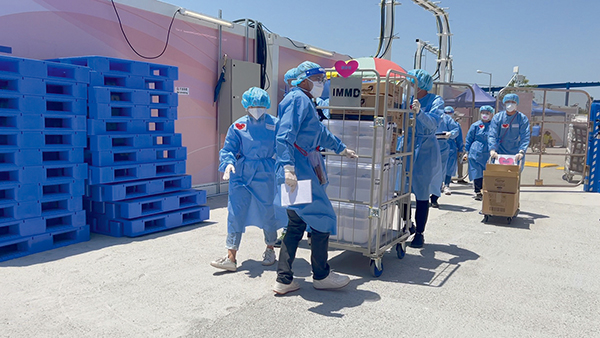
Care teams provided supplies catering to the needs of occupants.
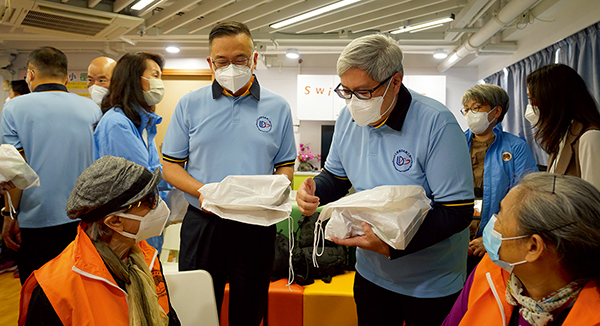
Led by the Director, the department's CIF representatives, the Immigration Department Volunteer Work Team and members of the Immigration Department Youth Leaders Corps distributed supplies to people in need.
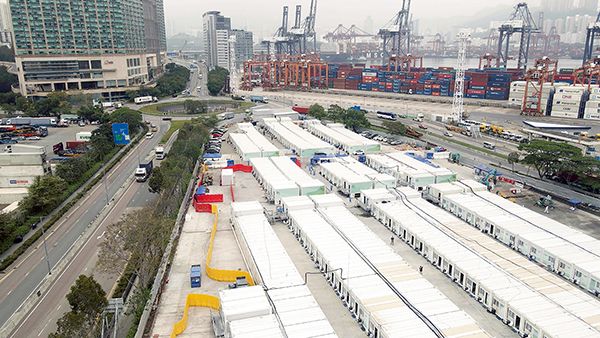
Commissioned on 1 March 2022, the CIF in Tsing Yi covers an area of 5.3 hectares, providing around 1,300 completed units.
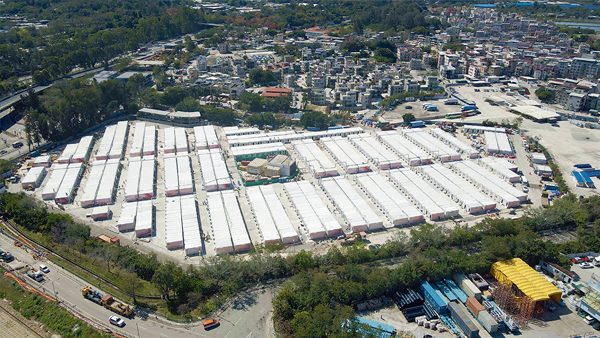
Commissioned on 9 March 2022, the CIF in San Tin covers an area of 3.8 hectares, providing around 720 completed units.

Commissioned on 17 March 2022, the CIF in Hung Shui Kiu covers an area of 3 hectares, providing around 550 completed units.
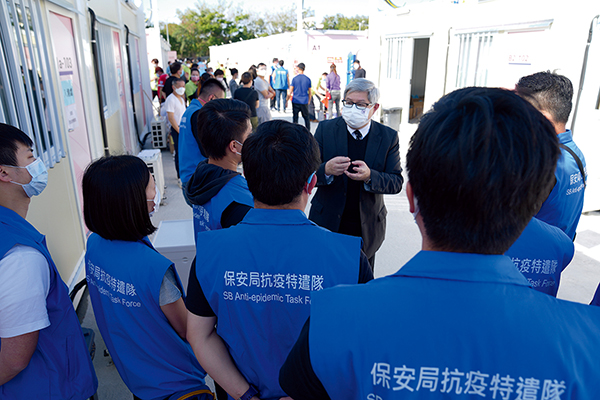
The Director visited the Mobile Cabin CIF in San Tin and encouraged frontline colleagues to fight shoulder to shoulder against the virus.
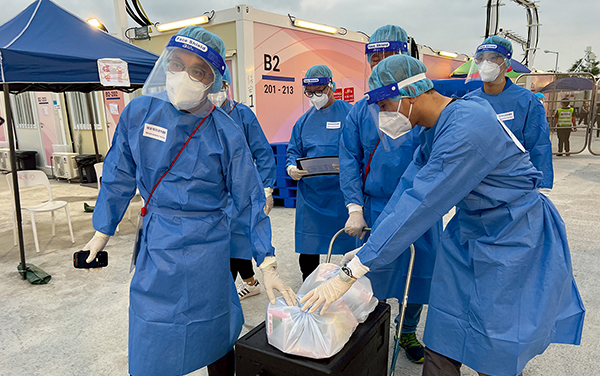
After the meals had been delivered, our officers immediately checked their temperature and quality, and tried to deliver the food to the occupants as soon as possible.
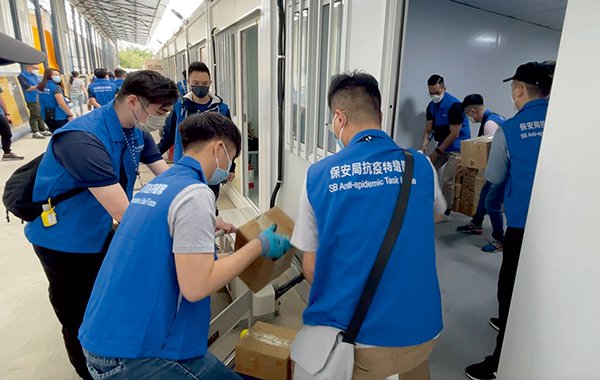
Our officers worked round the clock regardless of the weather conditions to deliver necessities at the request of the occupants, replenish as well as make an inventory of the supplies, racing against time in the fight against the epidemic.
After the handover of the Mobile Cabin CIFs, our officers immediately proceeded with preparatory work, which included directing traffic, conveying supplies, and tidying up rooms, etc, to fully prepare for the admission of persons in isolation.
In taking up the full management of the three Mobile Cabin CIFs in Tsing Yi, San Tin and Hung Shui Kiu, officers of the department had to be in full protective gear every day to perform registration procedures for the occupants and guide them into their units. In addition, our officers were responsible for monitoring the daily situation of occupants; formulating discharge arrangements; delivering the necessities; maintaining inventories; replenishing necessities; conducting stocktaking; maintaining the daily operation of the CIFs and liaising with different stakeholders. When the epidemic was severe, maintaining order in the Mobile Cabin CIFs was particularly crucial. Our officers implemented crowd control in the infected area and other areas of the CIFs to ensure the orderly delivery of necessities.
The department adopted the 'small-district management' mode in different Mobile Cabin CIFs, arranged designated officers to take care of the needs of the persons in isolation, set up a 24-hour designated hotline and WhatsApp support service in order to respond to the enquiries and requests of the occupants. The department also set up care teams to visit different small districts in the CIFs and proactively assist people in need, such as the elderly, persons with disabilities and ethnic minorities, embodying the 'people-oriented' spirit.
In May 2022, with the full support of the Central Government and the community's concerted efforts to fight against the virus, the epidemic gradually eased, and the Mobile Cabin CIFs were also put into standby mode. In order to make the best use of resources, the department cooperated with social welfare organisations in donating the supplies from the CIFs to those in need in the community, and arranged for members of the Immigration Department Youth Leaders Corps to participate in the relevant work to promote the 'people-oriented' ethos of the department in the community and pass on the caring spirit of Mobile Cabins.
Click below to view the videos: